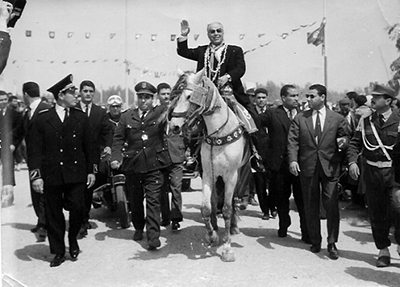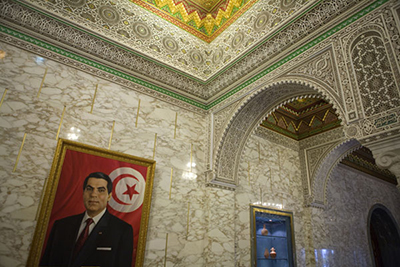by Youssef Cherif | (Middle East Center Blog, LSE Political Science) | – –
Tunisia, regarded as the Arab ‘beacon of hope’ and the cliché of Arab secularism and liberalism, raises a lot of expectations. Hence the most pressing point when Tunisia is discussed rotates around the 3000 Tunisian fighters who joined the ranks of Daesh (or ISIS). The problem might lay in a distortion of the nation-building process that started six decades ago, which left many Tunisians stateless in their own minds.
The 3000: Who are they?
Daesh recruitment strategies remain hard to comprehend. Reasons given to explain the group’s appeal are numerous: some advanced economic reasons, others pointed to ideology, some others to the search for glory and heroic achievements, etc. But while proven and factual, there are counter examples for most of the explanations given, especially in Tunisia which is home to one of the largest contingents of ISIS ‘nationals’.
Youngsters join Daesh because of unemployment, economists say. But many have left comfy houses and decent jobs to join the extremist sect. It is about religion, Orientalists contend; only hardcore Islamists join the organisation. Yet most ‘Daeshians’ are fresh zealots who barely practised Islam before. This is a quest for heroism, psychologists add; young fighters want to show-off in front of their peers. However, loads of married adult men immigrated with their families to the Spartan regions of Syria and Iraq.
What comes up as a pattern among the recruits is, however, different. It is hatred towards the home country, a feeling of not-belonging and an eagerness to endorse a new identity. The lack of national identity transcends classes and ages among ISIS recruits.
Nationalism: Rise and Fall
Tunisian textbooks claim that the country is 3000 years old. But the Tunisia we know – a modern nation-state with its national anthem, flag, definite boundaries and unified curriculum of education – is merely 60 years old. Habib Bourguiba, the country’s father of independence (President: 1957-1987), used his charisma, legitimacy and his companions’ skills to transform a ‘dust of individuals’ into the Tunisian Nation, as he liked to repeat.
Habib Bourguiba around the streets of Tunis, June 1955.
Tunisian nationalism, while tracing its origins back to the 19th century, was limited to a tiny elite until the 1930s. It was introduced to the masses thanks to the Destour Party – where Bourguiba evolved – but did not become widespread until the generalisation of Tunisia’s public system of education, flagship of the new state. No wonder why Tunisia, in the first years of independence, spent up to 30% of its GDP on education.
Modern state-building succeeded in creating a new bourgeoisie and disseminating the idea of national unity, bypassing ethnic and tribal divisions. But any opposition was confronted with harsh repression. Youssefists, followers of Salah Ben Youssef, who advocated for a ‘less westernised’ Tunisia. were crushed and their leader assassinated. Pan-Arabists, Marxists and Islamists were treated with similar violence. The State co-opted some of these, but many, especially among Youssefists, kept the flame burning and passed their anger on.
Besides, cracks multiplied as Bourguiba grew older. The astute politician became a senile dictator from the 1970s onwards, when the first generation of independence came to age. His personal saga, the nationalist narrative, the yoke of colonialism, all these stories from times past lost their meaning among young men and women who got some education and started –already- feeling the burden of a modern economy they were not prepared for.
The Hollow Shell of ‘Novembrism’
In the 1980s, Tunisia was on the verge of implosion. Zinelabidine Ben Ali, the general who overthrew Bourguiba in 1987, stepped-in and pledged to reform the system. Tunisian economy fared well under his rule, which led to a better quality of life. But political freedoms and human rights were literally abolished and the country turned into one of the most closed police states in the world.
Jealous of his predecessor’s aura and scared of his heavy shadow, Ben Ali started erasing Bourguiba from the public sphere and deconstructing his nationalist myth. Dozens of statues were toppled, streets and parks renamed, history curricula rewritten, etc. Furthermore, as the history of Tunisia’s Independence was tightly linked to Bourguiba, Ben Ali ordered to shift state propaganda away. Yet he could not provide an appealing alternative.
Portrait of Zine el-Abidine Ben Ali at the presidential palace, Carthage, 2008.
Shy and uncharismatic, Ben Ali was a secretive intelligence man who loathed public events. His public appearances were orchestrated in a soviet manner, with smiling people holding banners and flags cheering for him. He kept the people at distance, unable or unwilling to win their hearts and minds. He never became a second Bourguiba. Until his departure, few people could openly and freely claim that they loved Ben Ali.
He replaced the Independence narrative by a ‘strange cult of the Number 7’ which commemorates his assumption of power (November 7, 1987). Ben Ali’s propaganda turned around the ‘7’: there were statues of the number 7, avenues, cities, holidays, planes, etc.
Even the red colour, Tunisia’s national colour previously omnipresent in public places, vanished with Ben Ali. He replaced it with another colour, purple, which was his favourite colour; a colour that had no affiliation to the country’s traditions and history.
Ben Ali therefore emptied the half-filled box of nationalism from its content, providing the people with unsophisticated icons in replacement. He shaped a generation that has no roots in the country. He built a soul-less state. Between 1987 and 2011, the year Ben Ali fled, Tunisians hardly made sense of their national belonging outside of a football match or a song contest.
What the ‘Ben Ali Generation’ saw the most in the state was neither a common good nor a safe nest. It was, on the contrary, police repression, widespread corruption and social inequalities. They were an additional layer to the dissatisfied subjects of ‘Bourguibism’. They were the men and women who rose-up in 2010, mainly for economic motives, to burn police barracks and public buildings; the apolitical and leaderless initiators of the Arab Spring.
State-Building: Restart
This disenchanted youth did not find satisfaction in the Revolution. The economic crisis coupled with party-politics battles left most of Tunisia’s under 35 years old side-lined and angry. The number of electors in the 2014 elections was one million less than those who voted in the 2011 historic round, already limited. Their anger, added to the vacuum left by the unfinished nation-building project, is what Daesh exploits.
Tunisian authorities keep fighting the phenomenon by the means of Ben Ali’s strategy: an iron fist. There is also a general tendency to blame the Daesh-gate on the 2012-2014 Troika government. However, even if Ben Ali’s solution worked for a while, it had several flaws. Moreover, it cannot be applied anymore due to Tunisia’s fragmented security forces. As for the Troika indulgence accusations, while partly true, it hides the structural causes of the problem, and is a short-sighted political game.
Tunisian policymakers and intellectuals should understand that the country is in an era similar to the fifties, with two major differences: there is neither Bourguiba to rule nor a rallying cause to mobilise for. Instead of retreating to impulsive and outdated policies, they should look to the future and carry on with what they have. Another process of state-building should start, which goes with a radical reform of the system of education and its curricula.
Unlike Bourguiba’s imposed views of the nation, rebuilding the new Tunisia shall be democratic and inclusive, in order to be sustainable. This will ensure that the next generation of Tunisians know where they are from and who they are, limiting the emptiness that Daesh and the likes are able to fill. Only then can democracy function and elections have a meaning, and Arabs recover hope.
Youssef Cherif is a project manager for the Institute of War and Peace Reporting, working on Libya. Prior to that, he consulted for the Arab Institute for Business Managers (IACE, on Tunisian foreign policy), the United Nations (implementing the Post-2015 Agenda in Tunisia), the Tunisian Institute for Strategic Studies (ITES, on Arabian Gulf and North African affairs), The Carter Center in Tunisia (political affairs), among others. Youssef holds a Chevening M.A. in International Relations, from the Department of War Studies of King’s College London, and a Fulbright M.A. in Classical Studies from Columbia University.





 © 2025 All Rights Reserved
© 2025 All Rights Reserved